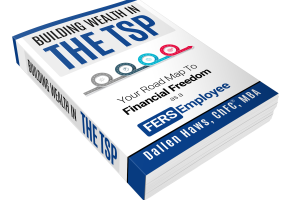It is very common for federal employees to have served at least a portion of their career in the military. If someone is not receiving military retirement pay, they are most likely eligible to buy back their military time to be included in their federal service. This is how it works.
Your retirement pension under civilian service is calculated by the following formula:
High 3 x Creditable Service x Multiplier
For example, if you are under the FERS system, have 24 years of service, and a high-3 of $110,000, then your pension calculation would look like this (assuming you were under age 62 at retirement time or else your multiplier would be 1.1%) :
$110,000 x 24 x 1% = $26,400 or $2,200 Per Month
When you buy back military time, that time is added back into your years of creditable service and thereby increasing your monthly pension. Using the same example as above, let’s say you decided to buy back your 6 years of military service which would then be added into your years of service. Your new pension calculation would look like this:
$110,000 x 30 x 1% = $33,000 or $2,750 Per Month
That is an extra $550/month or $6,600 per year, but the true difference is apparent when we look at the change over an entire retirement. Assuming you are retired for 30 years, that one decision to buy back your military time will put an extra $198,000 in your pocket.
Not only can buying back military time add to your pension, it can also allow you to retire earlier. You probably already know that there are certain requirements of creditable service to be eligible for an immediate annuity/pension. For FERS, this is 30 years at your MRA (Minimum Retirement Age), 20 years at age 60, or 5 years at age 62. Bought back military time can put you over those limits in some cases.
For example, let’s say you had 18 years of service at age 60 and decided to buy back 3 years of military service. That would give you a total of 21 years which would make you eligible for an immediate annuity right now without working another 2 years. It doesn’t always make sense to retire as soon as you possibly can but this will at least give you more options.
The Cost
Sounds great so far, right? Now, let’s talk about what it costs.
You must make a deposit to your agency to get civilian credit for your military service. The amount of this deposit is calculated with the following formula:
Total Military Base Pay x Multiplier (about 7% for CSRS and 3% for FERS) = Deposit
For example, let’s say you had 5 years of military service and your base pay for all 5 years was $30,000. Your calculation would look like this if you were under FERS:
$150,000 x 3% = $4,500
Wait, there’s More
This next part is why it pays (literally) to buy back your military time as soon as you decide it is a good idea for your plan. Once you are hired for civilian service, you have 3 years to pay the deposit before any interest starts to accrue. Every year after this 3-year grace period it will take a little more to buy back your military time. The amount of interest varies each year but it is not uncommon for feds to pay 2-3 times more in interest than their original deposit. The moral of the story is to buy back your military time as soon as possible.
Even when someone does wait a very long time to buy back their military it often still makes sense to do so. As we saw in the example at the beginning of this article, buying back time made a difference of almost $200,000 over a retirement. There are very few cases where it doesn’t make sense, but you will want to run the numbers for you to see how long it will take to earn back everything you paid for your deposit.
Conclusion
This topic is another great example of how knowing the rules can make such a difference in your retirement outcomes. Creating an incredible retirement is 100% our own responsibility and good news is that the government has some incredible benefits to make that happen. It comes down to you educating yourself to make sure that you can get the most out of your career as you transition into retirement.


